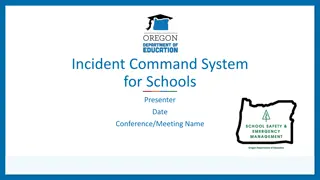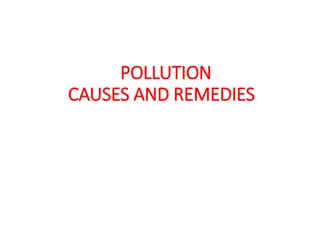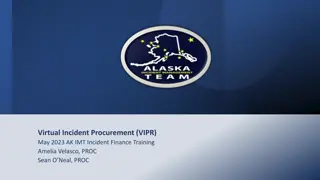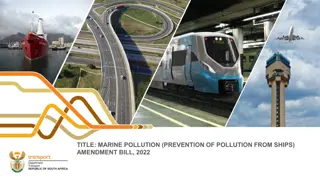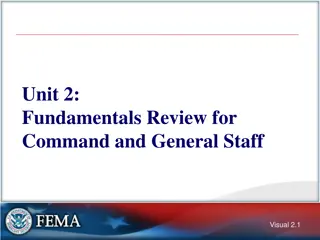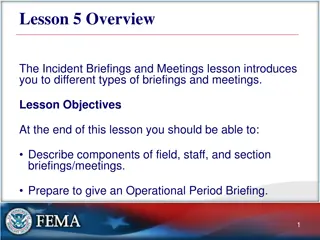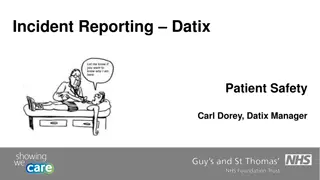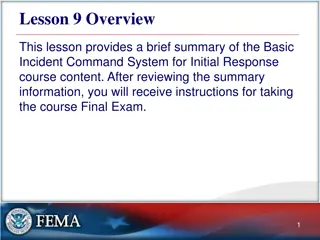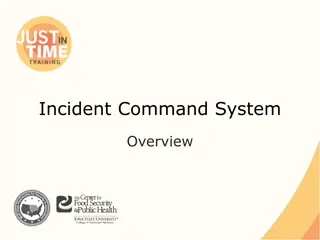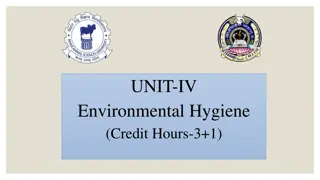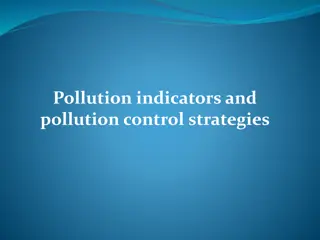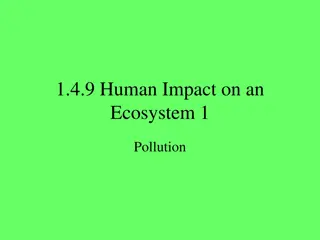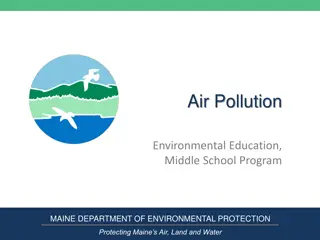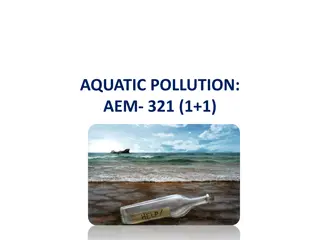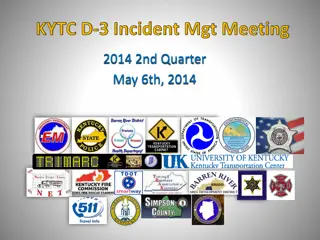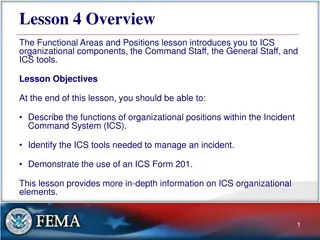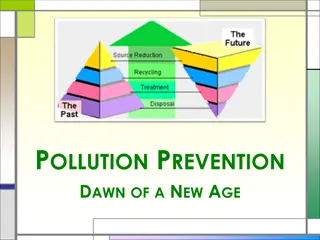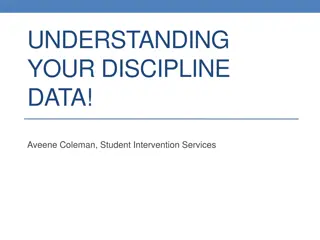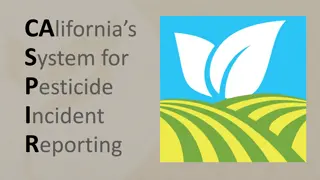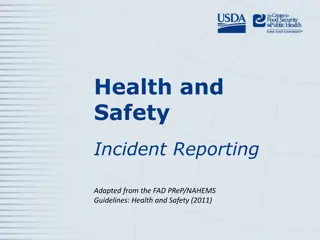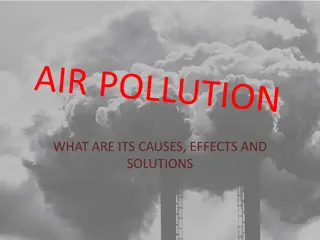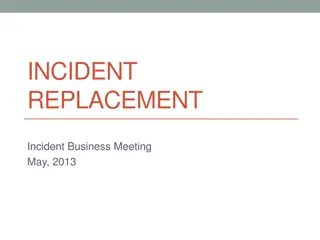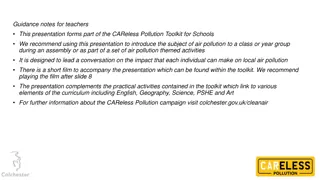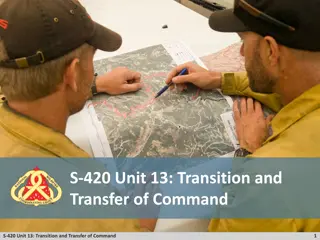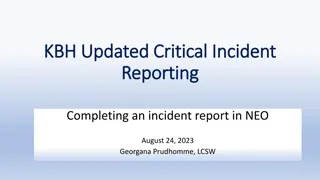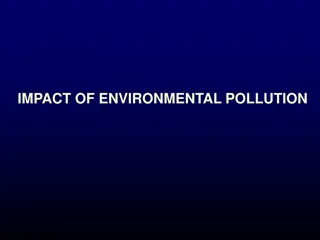Effective Incident Briefings and Meetings Overview
This lesson covers various types of briefings and meetings within the Incident Command System (ICS), including field, staff, and section briefings. It explores the Incident Action Planning Process for developing the IAP, emphasizing the importance of effective communication in incident management. T
0 views • 14 slides
Comprehensive Overview of Incident Command System for Schools
This presentation provides a detailed insight into the Incident Command System (ICS) for schools, outlining its purpose, structure, key concepts, and how individuals can fit into an ICS during emergencies. Topics covered include coordination with community partners, the importance of ICS, its struct
2 views • 16 slides
Understanding Pollution: Causes, Effects, and Remedies
Pollution, whether natural or manmade, refers to undesirable changes in the environment that impact air, water, and land, affecting human life and natural resources. Various pollutants like carbon monoxide, sulfur dioxide, and nitrogen dioxide contribute to air pollution, which can have harmful effe
2 views • 17 slides
Understanding Virtual Incident Procurement (VIPR) in Government Agencies
Virtual Incident Procurement (VIPR) is a web-based system used by the United States Department of Agriculture, Forest Service (USDA-FS) for incident procurement. It includes Incident Blanket Purchase Agreements (I-BPA) that allow Contracting Officers to create, award, and manage solicitation and agr
3 views • 37 slides
Understanding the Patient Safety Incident Response Framework (PSIRF)
The Patient Safety Incident Response Framework (PSIRF) is set to replace the Serious Incident Framework (2015) within the NHS, marking a significant shift in responding to patient safety incidents. Its key aims include compassionate engagement, system-based learning, proportionate responses, and sup
5 views • 9 slides
Marine Pollution Prevention Amendment Bill Overview
The Marine Pollution (Prevention of Pollution from Ships) Amendment Bill aims to incorporate MARPOL Annex IV and Annex VI to regulate sewage treatment, reduce marine pollution, and address ship energy efficiency and GHG emissions. The bill seeks to enhance environmental protection by restricting sew
5 views • 15 slides
Incident Management Fundamentals and Command Structure Review
Explore key NIMS doctrine concepts, agency policies, incident complexity factors, and Unified Command functions in managing complex incidents or events. Learn about Incident Action Planning, transfer of command, and the roles of Command and General Staff positions. Gain insights into incident comple
0 views • 11 slides
Incident Briefings and Meetings: Overview and Best Practices
This lesson covers various types of briefings and meetings within the Incident Command System (ICS), such as field, staff, and section briefings. Learn how to prepare and conduct operational period briefings effectively, understand the Incident Action Planning Process, and master the art of deliveri
2 views • 14 slides
Understanding Different Types of Pollution and Ways to Combat Them
Pollution comes in various forms such as water, noise, air, thermal, and land pollution. Each type has specific sources and impacts. Air pollution, caused by industrial activities and burning of fossil fuels, emits harmful substances into the air. Water pollution occurs due to the discharge of chemi
0 views • 13 slides
Understanding Incident Reporting in Healthcare
Incident reporting in healthcare is crucial for patient safety and organizational improvement. An incident can encompass a wide range of events that cause or have the potential to cause harm, loss, or damage. Reporting incidents, including near misses, allows for learning from both mistakes and succ
0 views • 10 slides
Advancements in Air Pollution Prediction Models for Urban Centers
Efficient air pollution monitoring and prediction models are essential due to the increasing urbanization trend. This research aims to develop novel attention-based long-short term memory models for accurate air pollution prediction. By leveraging machine learning and deep learning approaches, the s
0 views • 17 slides
Basic Incident Command System Overview
This lesson provides a summary of the Basic Incident Command System for Initial Response course content. It covers the NIMS framework, ICS management systems, incident command structure, unity of command, communication protocols, delegation of authority, and management by objectives. Understanding t
5 views • 15 slides
Incident Command System Overview and Structure
Incident Command System (ICS) provides a standardized approach to incident management. It offers flexibility, adaptability, and efficient management for incidents of varying sizes and complexities. ICS consists of top-down structure with key functions like logistics, operations, planning, finance/ad
1 views • 22 slides
Understanding Industrial Pollution and Waste Management
Industrial pollution, stemming from manufacturing activities, poses a significant threat to the environment. This pollution, including air, water, and soil contamination, results in environmental degradation. Industrial waste, both hazardous and non-hazardous, further compounds the issue, requiring
0 views • 15 slides
Understanding Environmental Hygiene: Air Pollution and Composition of Air
The content delves into the concept of atmospheric pollution, the composition of pure and impure air, sources of air pollution, and the zones of the atmosphere. It highlights the detrimental effects of pollutants on health and the environment, emphasizing the importance of environmental hygiene. The
1 views • 27 slides
Taking Action Against Plastic Pollution
Plastic pollution is a pressing global issue that harms both the environment and human health. The excessive use of plastic leads to devastating consequences, such as ocean pollution and wildlife endangerment. This article emphasizes the importance of reducing single-use plastics, adopting recycling
0 views • 8 slides
Understanding Pollution: Indicators and Control Strategies
Pollution is a significant environmental issue, yet often misunderstood. This article delves into the definition of pollution, classification, and considerations for effective pollution control strategies. It discusses the UK Environmental Protection Act of 1990, pollutant properties, toxicity, and
2 views • 50 slides
Understanding Pollution and its Ecological Impact
Pollution is any human addition to the environment that disrupts the ecosystem's ability to sustain life. This includes pollutants like CO2 and chemicals from various sources that harm air, water, and land. Different types of pollution such as industrial, agricultural, and domestic pollution have ad
0 views • 25 slides
Understanding Air Pollution and Its Impact on Health and Environment
Air pollution poses a significant threat to human health, the environment, and the economy. The Clean Air Act has played a crucial role in reducing air pollutants since its establishment in 1963. Criteria air pollutants such as ozone, particle pollution, carbon monoxide, lead, sulfur dioxide, and ni
1 views • 11 slides
Understanding Nutrient Pollution and Its Impact on the Environment
Nutrient pollution, characterized by the excess input of nitrogen and phosphorus into water and air, is a significant environmental issue with far-reaching consequences. It can lead to toxic algae blooms, dead zones, economic losses, and adverse effects on human health. The causes of nutrient pollut
2 views • 11 slides
Understanding Pollution and Purification in Greek Religion
The concept of pollution and purification played a crucial role in maintaining religious and social norms in ancient Greek society. Breaking boundaries or defying societal expectations could lead to pollution, necessitating purification rituals. Examples of actions that could cause pollution include
0 views • 7 slides
Debunking Myths About Air Pollution
Explore the truth behind common misconceptions about air pollution through a series of statements. Learn about the impact of vehicle emissions, indoor air quality, health effects of polluted air, and the role of trees in combating pollution. Uncover the facts to better understand the challenges of a
1 views • 8 slides
Understanding Aquatic Pollution and Its Impact on Water Quality
Aquatic pollution is a significant concern affecting the environment and human health. It includes various pollutants entering water bodies from land-based activities, causing harm to aquatic life and humans. Pollution sources can be classified into point source and non-point source. Monitoring wate
2 views • 13 slides
Comprehensive Environmental Chemistry Open Course Overview
This open course offered by the Department of Chemistry covers various aspects of environmental chemistry, including air and water pollution, soil pollution, noise pollution, thermal pollution, and radioactive pollution. Students will learn about the causes and effects of different types of pollutio
3 views • 9 slides
KYTC.D-3 Incident Management Meeting 2nd Quarter May 6th, 2014
The KYTC.D-3 Incident Management Meeting for the 2nd quarter of 2014 held on May 6th discussed various topics including recent incidents, emergency plans, construction projects, spill cleanup, and upcoming training opportunities. Detailed incidents such as crashes and fires on I-65 and Nunn Pkwy wer
0 views • 24 slides
Understanding Air Pollution and Its Impact on Health
Discover the importance of Earth's air quality and how pollution affects our health. Explore the respiratory system, the effects of air pollution on different groups like athletes and seniors, and the significance of green spaces in combating pollution. Learn how to check your community's air qualit
0 views • 52 slides
Transitioning to Incident-Based Crime Reporting: Enhancing Transparency and Accountability
Anytown Police Department (APD) is leading the transition from Summary Reporting to Incident-Based Reporting through the National Incident-Based Reporting System (NIBRS). This change promotes transparency, provides detailed crime data to the public, and improves statewide and national crime statisti
3 views • 17 slides
Understanding Incident Command System (ICS) Organizational Components
This lesson introduces the key components of the Incident Command System (ICS), including the Command Staff, General Staff, and essential tools. It covers the roles of the Incident Commander, Deputy Incident Commander, and Command Staff positions, emphasizing their functions in managing incidents ef
0 views • 40 slides
POLLUTION PREVENTION: A Closer Look at Environmental Initiatives in Oklahoma
Explore the evolution and implementation of pollution prevention measures in Oklahoma, focusing on statutory directives, recent activities, recycling efforts, tax credits, and more. The Pollution Prevention Act of 1990 plays a crucial role in reducing environmental hazards through the reduction of p
0 views • 31 slides
Understanding Discipline Data Collection in Educational Institutions
The data illustrate the importance of accurately reporting discipline and truancy data using Incident Management Systems in educational institutions for the 2019-20 school year. The process involves coding data in Incident Management, avoiding additional codes, and adhering to federal reporting requ
0 views • 60 slides
California's System for Pesticide Incident Reporting Overview
Explore California's CASPIR system for reporting pesticide incidents, designed to enhance communication between counties, DPR, and fieldworker groups. The system's timeline, purpose, and key features, including incident report submission, intelligent case routing, mobile app functionality, and admin
0 views • 33 slides
Health and Safety Incident Reporting Guidelines
Learn about incident reporting procedures adapted from the FAD PReP/NAHEMS guidelines for health and safety incidents. Find out the steps to take when an incident occurs, including reporting requirements, documentation, and workers' compensation processes.
0 views • 14 slides
Understanding Air Pollution: Causes, Effects, and Solutions
Pollution is the harmful introduction of contaminants into the environment, caused by human activities and natural disasters. It impacts all living organisms, making it challenging to sustain life. Air pollution, a major form of pollution, occurs when pollutants such as gases, dust particles, and fu
0 views • 8 slides
Incident Replacement Procedures and Guidelines in Business Meetings
Explore the process of incident replacement in business meetings, including who needs replacement items, approval authorities, and necessary forms to complete. Reference materials such as the IIBMH handbook and NWCG guidelines provide detailed insights into managing incidents effectively. Understand
0 views • 25 slides
Addressing Air Pollution in Schools: A Presentation and Toolkit Overview
Introduction to air pollution using a presentation from the CAReless Pollution Toolkit for Schools. Covers what air pollution is, its causes, and the specific impact on areas like Colchester and schools. Aimed at starting a conversation on individual actions to combat local air pollution, complement
0 views • 16 slides
Drawbacks of City Living: Traffic Jams, Pollution, and Overcrowding
Living in a city presents several challenges including traffic jams due to increasing population, pollution affecting health and the environment, and noise pollution from construction activities. These factors make city life difficult for residents. The content discusses the drawbacks of city living
2 views • 8 slides
Transition and Transfer of Incident Command
Ensuring effective transition and transfer of incident command is crucial for incident management. This involves activities such as demobilization planning, transfer of command planning, incident package creation, and more. Detailed plans need to be in place to facilitate a smooth handover of author
0 views • 12 slides
Understanding Critical Incident Reporting in Behavioral Health Services
Behavioral health services providers like KBH are required to report and track critical incidents and sentinel events in order to ensure client safety and program integrity. This involves identifying trends, reporting abuse, and following specific reporting processes set by accrediting bodies. The N
0 views • 29 slides
Understanding the Impact of Environmental Pollution
Environmental pollution, caused by the introduction of contaminants into the air, water, and soil, has detrimental effects on ecosystems and human health. This pollution includes air pollution from various sources like combustion and industrial processes, leading to the formation of harmful pollutan
0 views • 61 slides
Feedback Analysis on Medication Incident Reporting in Hospitals
Feedback received from IMSN members on NIMS and incident reporting revealed various issues affecting the rates at which staff report medication incidents/near misses within hospitals. Major themes included staffing numbers and turnover, pharmacist involvement in incident reporting, clinical pharmacy
0 views • 12 slides

